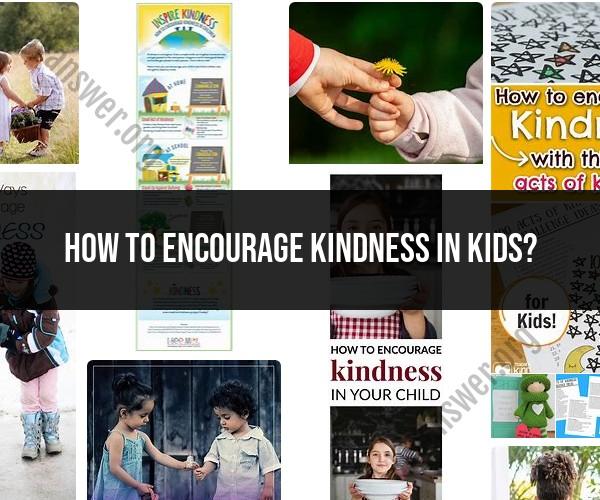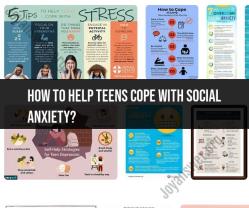How to encourage kindness in kids?
Encouraging kindness in children is essential for their social and emotional development, as well as for fostering positive relationships and a compassionate attitude toward others. Here are some parenting guidance tips to help encourage kindness in kids:
Be a Role Model:
- Children learn by example. Demonstrate kindness and empathy in your own interactions with others, including your child, family members, and friends.
Teach Empathy:
- Help your child understand and relate to the feelings and perspectives of others. Discuss emotions and ask questions like, "How do you think they felt?" or "How would you feel in that situation?"
Practice Gratitude:
- Encourage your child to express gratitude for the kindness of others and the things they have in their life. Share what you're grateful for as well.
Read Books About Kindness:
- Choose age-appropriate books that emphasize kindness, empathy, and compassion. Reading together can spark discussions about these values.
Use Positive Language:
- Encourage your child to use kind and respectful words when communicating with others. Praise them when they do so.
Teach Conflict Resolution:
- Help your child learn peaceful ways to resolve conflicts, such as using "I" statements, listening actively, and finding compromises.
Volunteer Together:
- Engage in volunteer activities as a family. This shows your child the value of helping others and giving back to the community.
Encourage Sharing:
- Teach your child the importance of sharing toys and resources with siblings and friends. Reinforce the idea that sharing makes others happy.
Set Expectations:
- Establish clear expectations for kind behavior, both at home and in social settings. Discuss the importance of treating others with respect.
Offer Praise and Encouragement:
- Recognize and praise acts of kindness and empathy. Celebrate when your child helps someone or shows consideration for others.
Avoid Rewards for Kindness:
- While it's important to acknowledge and praise kind behavior, avoid the habit of giving material rewards for being kind, as it may diminish the intrinsic value of kindness.
Encourage Perspective-Taking:
- Help your child see situations from another person's point of view. Discuss how their actions can impact others.
Limit Exposure to Negative Influences:
- Monitor your child's media and online content to ensure it promotes positive values. Discuss any negative influences they encounter and help them understand the difference between fiction and reality.
Create a Kindness Jar:
- Have a jar where your child can place a token or note each time they perform an act of kindness. Celebrate together when the jar is full.
Be Patient and Consistent:
- Fostering kindness is an ongoing process. Be patient and consistently reinforce the importance of being kind in various situations.
Encourage Self-Kindness:
- Teach your child that kindness should also extend to themselves. Help them understand the importance of self-compassion and taking care of their emotional well-being.
Remember that children learn at their own pace, and it's normal for them to make mistakes. Encouraging kindness is a lifelong journey, and your guidance and positive reinforcement play a significant role in shaping your child's values and behavior.
Nurturing Kindness in Children: A Guide for Parents and Educators
Kindness is an important quality for children to develop. It can help them to build strong relationships, succeed in school, and make a positive impact on the world. Parents and educators can play a key role in nurturing kindness in children.
Here are some tips:
- Be a role model. Children learn by watching the adults in their lives. Be kind to others, and your children will be more likely to be kind as well.
- Talk to your children about kindness. Explain to your children what it means to be kind and why it's important. Help them to understand that kindness is not just about being nice to others, but also about being helpful, compassionate, and understanding.
- Create opportunities for children to practice kindness. Encourage your children to do small acts of kindness for others, such as holding the door open for someone, helping a younger child with their homework, or donating to a charity.
- Praise your children for being kind. When your children are kind to others, be sure to praise them for their actions. This will help them to understand that kindness is valued and appreciated.
Teaching Kids Empathy and Compassion: Strategies for Encouraging Kindness
Empathy and compassion are essential components of kindness. Empathy is the ability to understand and share the feelings of another person. Compassion is the feeling of concern and sympathy for another person's suffering.
Here are some strategies for teaching kids empathy and compassion:
- Talk to your children about their own feelings. Help your children to identify and label their own emotions. This will help them to better understand their own feelings and the feelings of others.
- Talk to your children about the feelings of others. Help your children to identify and label the emotions of others. This will help them to better understand how others are feeling.
- Read books and stories to your children about kindness, empathy, and compassion. This can help them to learn about these important qualities and to see how they can be put into practice.
- Encourage your children to help others in need. This can help them to develop a sense of compassion and empathy for others.
Acts of Kindness: Inspiring Children to Spread Love and Positivity
Here are some ideas for acts of kindness that children can do:
- Hold the door open for someone.
- Help a younger child with their homework.
- Donate to a charity.
- Volunteer their time to a cause they care about.
- Write a letter or send a card to someone who is sick or lonely.
- Smile and say hello to people they meet.
- Pick up litter.
- Help out around the house without being asked.
- Let someone go ahead of them in line.
- Give a compliment to someone.
- Help a neighbor with their yard work.
- Visit a nursing home or animal shelter.
- Bake cookies for their friends and family.
- Donate their old toys and clothes to charity.
By encouraging children to perform acts of kindness, we can help them to make the world a better place.












